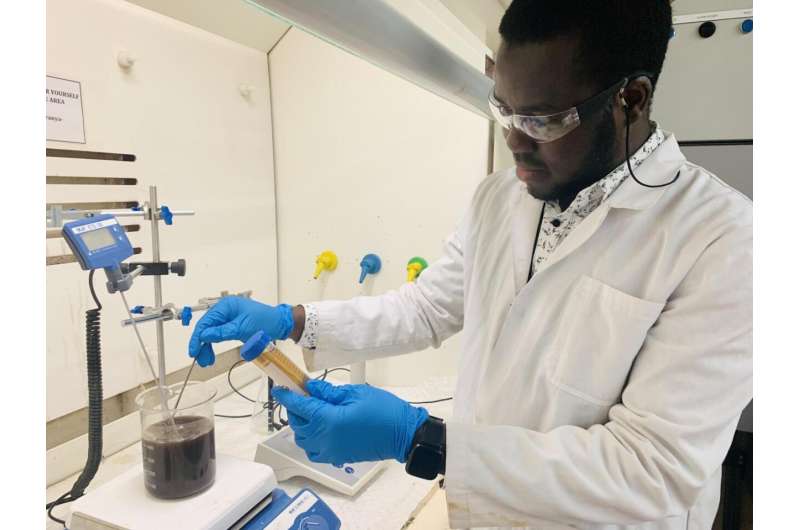RMIT Ph.D. researcher Ibrahim Hakeem in the lab at RMIT University. Credit: RMIT University
Engineers in Melbourne have developed a cost-effective and environmentally friendly way to remove heavy metals, including copper and zinc, from biosolids.
The team's work, led by RMIT University in collaboration with South East Water and Manipal University in India, advances other methods for heavy-metal removal by recycling the acidic liquid waste that is produced during the recovery phase, instead of throwing it away.
Lead senior researcher Professor Kalpit Shah from RMIT said the heavy metals found in biosolids—treated sewage sludge—can be valuable, and the recovery of metals such as copper and zinc can be achieved using the team's approach.
"Our innovation helps ensure the resulting biosolids do not leach heavy metals into the environment and retain the nutrients that can be used for land applications," said Shah, Deputy Director (Academic) of the Training Centre for the Transformation of Australia's Biosolids Resources in RMIT's School of Engineering.
"With further processing, the biosolids can be turned into high-grade biochar, which is a renewable energy resource and has a range of applications including as a fertilizer."
The research is published in the journal Hydrometallurgy.
How does the innovation work?
The overall metal-removal process occurs over three stages: extraction, purification and recovery.
Prior to the team's work, metal recovery from biosolids had not been fully explored among researchers beyond the first stage.
The first author of the journal article, RMIT Ph.D. researcher Ibrahim Hakeem, said biosolids can contain several metals locked within organic matter, making purification and metal recovery challenging.
"We devised an approach where we were able to recover the metals one by one and did so with a closed-loop solution that causes least harm to the environment," said Hakeem, from RMIT's School of Engineering.
Co-author from Manipal University, Dr. Abhishek Sharma, said this work was beneficial for improving the efficiency of the overall process during biosolids conversion to biochar via pyrolysis.
Shah said the work complemented the team's biochar-producing pyrolysis technology, which South East Water, Intelligent Water Networks (IWN) and Greater Western Water are trialing at the Melton Recycled Water Plant.
"Pyrolysis is a process that uses heat to break down organic materials into valuable products and occurs without oxygen to prevent the materials from burning. The team uses this process to remove pathogens and contaminants of emerging concern from biosolids."
Co-author and Deputy Director (Industry) of the Training Centre for the Transformation of Australia's Biosolids Resources, Dr. Aravind Surapaneni, said water industries globally were considering alternative thermal conversion technologies such as pyrolysis to address concerns over contaminants including per- and poly-fluoroalkyl substances (PFAS).
The challenge is that reducing the organic matter through pyrolysis results in a higher concentration of heavy metals in the biochar, which the team's new technique helps resolve.
The application of biosolids to agricultural land in Australia is subject to guidelines and regulations that specify limits for heavy-metal concentrations, ensuring that biosolids can be safely used as fertilizer.
What are the next steps?
The team aims to work with water authorities to use its heavy-metal removal technique prior to pyrolysis.
"The transition to a circular economy is important for the water industry," said South East Water's R&D Manager, Dr. David Bergmann.
"We have previously seen our sludge as waste, but now through research like this we are able to see that it's possible to clean it up and convert it into potential materials with value and further applications."
Shah said the team's innovation could also be used for other waste streams such as storm water lagoon sludge and mine tailings.
'"We are planning to work with South East Water to do a techno-economic analysis which will hopefully lead to pilot-trialing."
"We're also keen to work with companies who manage storm water lagoons as well as mine tailings. The next step of engagement with them could be testing their samples in our lab followed by the pilot-trialing," he said.
More information: Ibrahim Gbolahan Hakeem et al, Investigations into the closed-loop hydrometallurgical process for heavy metals removal and recovery from biosolids via mild acid pre-treatment, Hydrometallurgy (2023). DOI: 10.1016/j.hydromet.2023.106044
Provided by RMIT University
























